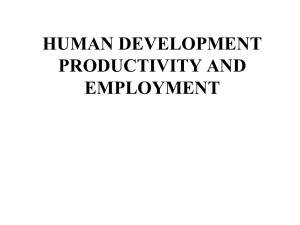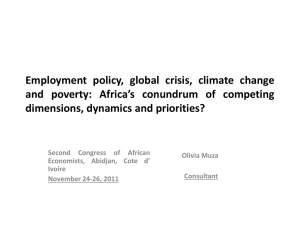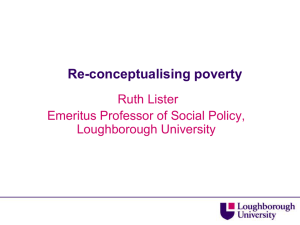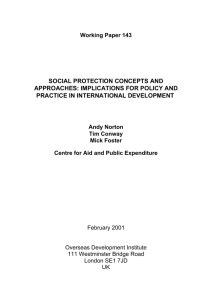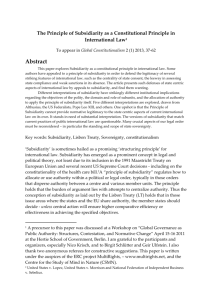Are minimum social standards at EU level possible?
advertisement
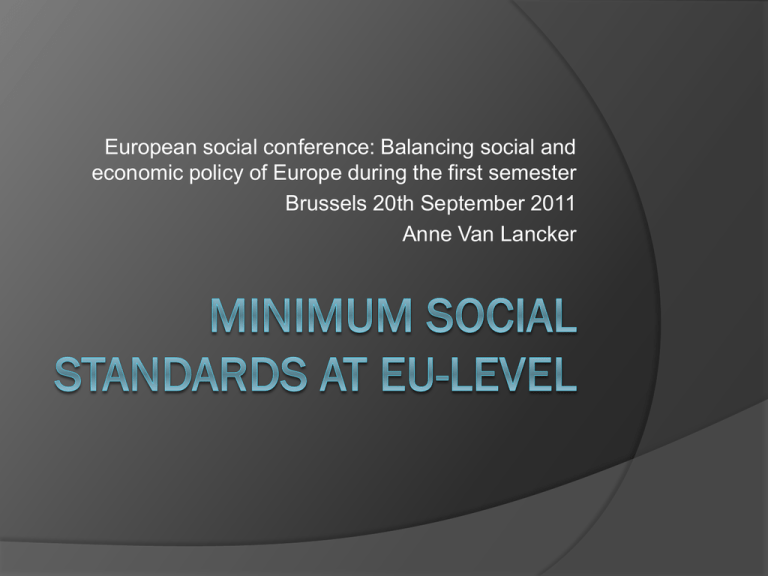
European social conference: Balancing social and economic policy of Europe during the first semester Brussels 20th September 2011 Anne Van Lancker Social standards are needed No ‘trickle down’ effect of growth on social inequalities Social cohesion and social justice should be actively persued, also by EU Internal market requires social policy as productive factor Ensure people’s support: high expectations, low delivery Social situation in Europa:great diversity BBP/capita Social situation in Europa: great diversity unemployment Social situation in Europe: great diversity (child) poverty % of total population concerned 30 25 20 15 10 5 0 EU25DK FI CY DE SI FR NL BE AT SE BG* CZ SK MT EE LU PT IE EL ES UK IT LT RO* HU LV PL Children (0-17) Total Social standards between subsidiarity and economic integration Treaty changes have gradually increased EU competence in social field Reasonable results on labour law, nondiscrimination, equal opportunities… But compared with strong economic integration, social policy remains largely with Member States Division of labour: EU creates market, Member States develop welfare state Social standards between subsidiarity and economic integration ‘separate worlds’ = illusion! Free movement of people + equal treatment: access to social benefits not restricted to national citizens Internal market and competition rules also apply to social and health services: public procurement, state aid Liberalisation of ‘second pillar’ pension schemes and health insurance EU common values and elements of shared identity (symbolic boundaries) Transnational sharing schemes A2 EU Social space EU economic space (EMU) Cross border Private insurences schemes A1 Nation –based welfare state A B Supra national Sharing schemes A4 C Sub-national & cross-regional schemes A3 D Based on Maurizio Ferrera, Mapping the components of Social EU EU action on social standards on income In ‘70thies: Poverty Programmes 1992 Council recommendation on common criteria concerning sufficient resources and social assistance in social protection systems: Member States to recognise the basic right of a person to sufficient resources and social assistance to live in dignity; progressively set a guaranteed minimum income; adapt social protection systems Common principles and guidelines to achieve convergence toward common objectives such as poverty reduction EU action on social standards on income Lisbon strategy 2000 includes social objectives, including ‘eradication of poverty’ Social OMC: common goals, indicators (including at-risk-of-poverty treshold 60% of median income), NAPs, joint reports But poverty rates remain high and almost no change EU action on social standards on income 2008 Commission recommendation on active inclusion of people excluded from the labour market: three strands: adequate income support, inclusive labour markets, access to quality social services – explicit reference to 1992 council recommendation criteria Social policy after Lisbon Treaty Strong common social values and objectives Charter of Fundamental Rights, including social rights Horizontal social clause: mainstreaming of social objectives in all policies Role of social partners and civil society strengthened Coordination of social and employment policy of Member States Social policy after Lisbon Treaty But no new competences in social field No EU competence on wages EU law on minimum standards on social security: unanimity required Coordination of Member States’ policy on poverty and social exclusion, pensions, health care: ‘soft’ OMC Europe 2020: new opportunities for more social EU? Better coordination of economic, environmental, employment and social policies Poverty reduction = headline target + guideline 10 of integrated guidelines Flagship European Platform Against Poverty Stronger governance: European semester, NRPs, recommendations including on poverty Europe 2020: new opportunities for more social EU? But in practice: strong dominance of ECOFIN, focus on budgetary discipline, austerity measures, structural reform No recommendations on poverty Social OMC needs strengthening: more binding targets, stronger involvement of parliaments, social partners and civil society But future of social OMC still uncertain Right to decent minimum income as a first new social standard Rights to decent minimum income could become first EU social standard of new generation Poverty is longstanding priority on EU agenda, but soft power is not working Most Member States have minimum income schemes, but most are insufficient for life in dignity Minimum income, together with inclusive labour market and access to quality services, is key in fight against poverty Right to decent minimum income as a first new social standard But resistance of Member States: « national competence, subsidiarity » « No EU legal competence for law on income» Big differences between Member States in adequacy of minimum income schemes, take-up and coverage Legimacy of at-risk-of-poverty treshold (60% of median income) questioned High budgetary cost: 130 billion EUR, big differences in efforts needed in MS Right to decent minimum income as a first new social standard Subsidiarity respected: poverty treshold on basis of median national income Legal base for minimum income of last resort: minimum standards for integration of people excluded from labour market (TFEU art 153, 1,h) Progress on minimum income could trigger progress on social security benefits and minimum income Right to decent minimum income as a first new social standard EU Network of independent experts on social inclusion: «combined effort of adequate minimum income and other policy measures» should reach 60% treshold Use of ‘budget standards’: basket of goods and services to live a life in dignity Establish ‘country roadmap’, with national timeframe to achieve goal Right to decent minimum income as a first new social standard EAPN campaign supported by Social Platform, ETUC, S&D group, Greens and GUE in European Parliament THANK YOU FOR YOUR ATTENTION!




